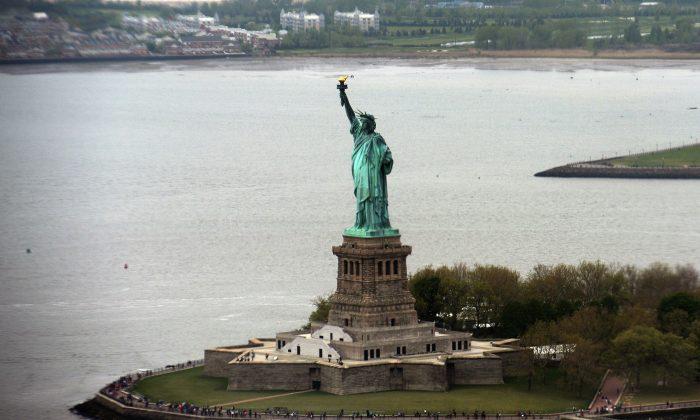Various rebellions have raged in the West since Wat Tyler’s peasant uprisings in late 14th century England.
But, from the start of America’s War of Independence to the turn of the second millennium, three principal revolutionary movements have competed for cultural hegemony and global political power.
The American Revolution (1776)
The American Revolution pitted the idea of republican democracy against the power of imperial aristocratic authority. American revolutionaries held that the natural rights of Englishmen, acquired since the Magna Carta, should not be denied to His Majesty’s subjects in the American colonies.With regard to economic principles, Americans looked to British philosophers such as John Locke and Adam Smith, who stood for the citizen’s right to hold property and participate in a free market economy. They stood against heavy taxation, state-mandated monopoly, unnecessary regulation, and stifling protectionism built into the European mercantilist systems of the era.
The Soviet Revolution (1917)
The Soviet Revolution sought the violent overthrow of an emerging constitutional monarchy and its replacement with a communist “people’s” dictatorship.Looking to European philosophers such as Jean Jacques Rousseau, Karl Marx, and Friedrich Engels, Russian Bolsheviks proffered a state-directed economy. The guiding Marxist principle proposed that all means of production be placed in the hands of the workers. This led to the abolition of private property and independent enterprise.
The British Revolution (1890–1950)
A third revolutionary movement, less highlighted by a dramatic military confrontation like the American War of Independence or the Russian Civil War, emerged during the final decade of the 19th century.This formative movement was led by a British socialist club known as the Fabian Society. The purpose of the organization’s talented literary membership was to advance the principles of democratic socialism through gradualist and reformist policies in existing democracies.
At first, the “British Revolution” appeared exceedingly reasonable to people of good will. It posited “social democracy” over the draconian excesses of “Soviet communism.”
With regard to economic principles, the movement called for the abolition of corporate ownership in favour of the nationalization of major industries and essential services. Private enterprise was to be reserved for small businesses that could be regulated and controlled in “the public interest.” It aimed to replace capitalist “greed” with socialist “fellowship.”
The Impact of the “British Doctrine”
From the early 1970s onward, democracies around the world have felt the cultural impact of the “British Revolution.” Moynihan contended that its influence accelerated in 1947 when a newly elected socialist government in the UK granted independence to a mimetic socialist administration in India.The legitimate post-war impulse toward “decolonization” and national liberation was co-opted by a uniform ideology that fashioned its principles and policies from the general corpus of British socialist thought as it had developed between 1890 and 1950.
This post-modern “British Doctrine” produced Utopian “re-imaginings” of collective solidarity over human autonomy, public ownership over private enterprise, cooperation over competition, common resource usage over private property, and a comprehensive dedication to the redistribution of wealth through government planning.
Altogether, this democratic socialist ideology was much less anti-Soviet than it was stridently anti-American. Through the pages of publications such as “The New Statesman” and the “Manchester Guardian” and the classrooms of universities such as the London School of Economics, British intellectuals spread the creed of the British Revolution throughout the world. England may have abandoned Victorian ideas of empire, but English-speaking academics and civil servants became “prefects” for a newly emerging majority in the United Nations.
America’s Choice
While American cities are being torched and looted by the heirs of Fabian idealists, and the authentically liberal principles of the American Revolution are being maligned by progressive scribes and community activists, it’s worth reflecting on what’s at stake for the United States and her allies in the forthcoming election.By the late 1970s, a “nanny state” disposition in the nation’s of the North Atlantic triangle led by Fabian-style leaders such as Pierre Elliott Trudeau, James Callaghan, and Jimmy Carter resulted in sluggish economies, inflation, and troubling levels of unemployment. At that time, voters sought a cure for the “British Disease” through the election of Margaret Thatcher, Ronald Reagan, and Brian Mulroney.
The result of the Thatcher/Reagan revolution, which embraced the same principles as those of America’s founders, was over 25 years of general economic prosperity, which economists came to call “the great moderation.” During that period, even Democratic President Bill Clinton declared that the era of big government was over.
But what appeared to be the “end of history” and the final triumph of democratic capitalism over Marxist-inspired alternatives soon diminished in the face of unrelenting cultural opposition. Entrenched armies of progressive educators, academics, journalists, artists, entertainers, civil servants, and cosmopolitan corporate executives kept the revolutionary fabric of the left intact beneath a thin veil of “minimal state” administrative policies.
When the financial downturn of 2008 occurred, impressionable young voters had already been culturally prepared to, once again, reject the principles of the American Revolution in favor of the familiar “welfare state” progressive platform of Barack Obama. The predictable outcome was one of the most sluggish economic recovery periods in U.S. history.
Over roughly the same era, the center of Marxist-Leninist revolutionary communism shifted from Moscow to Beijing. Today, it’s the Chinese Communist Party (CCP) that’s committed to reshaping the world in its own image.
According to an important new book entitled “Hidden Hand” by Clive Hamilton and Mareike Ohlberg, the CCP, like its Bolshevik predecessor, is not interested in democracy. “It sees,“ say the authors, ”only a bitter ideological struggle with the West, dividing the world into those who can be won over, and enemies.”
A Tide in the Affairs of Men
The prolific American scholar Victor Davis Hanson has suggested that the November 2020 vote will be one of the most important in U.S. history.Sixteenth century British playwright William Shakespeare famously wrote: “There is a tide in the affairs of men, Which, taken at the flood, leads on to fortune; Omitted, all the voyage of their life, Is bound in shallows and in miseries. On such a full sea are we now afloat, And we must take the current when it serves, Or lose our ventures” (“Julius Caesar”, Act 4, scene 3).
Watershed historical moments are central to a nation’s destiny. Americans who voted for Republican candidates in 2016 sought to creatively turn the clock back to the Enlightenment revolutionary principles of 1776. They chose freedom over tutelage and looked to restore the greatness of their nation.
Those on the other side of the political dialectic seek power and security in some form of international socialist order, which is almost certain to be led by the CCP. They wish to go down what Austrian economist Friedrich Hayek described as the road to serfdom. “If socialists understood economics,“ said Hayek, ”they wouldn’t be socialists.”
Looking on from north of the 49th parallel, I’m inclined to place our hopes for a better future in solidarity with American patriots who will come together this week to celebrate another July 4th, Independence Day!





